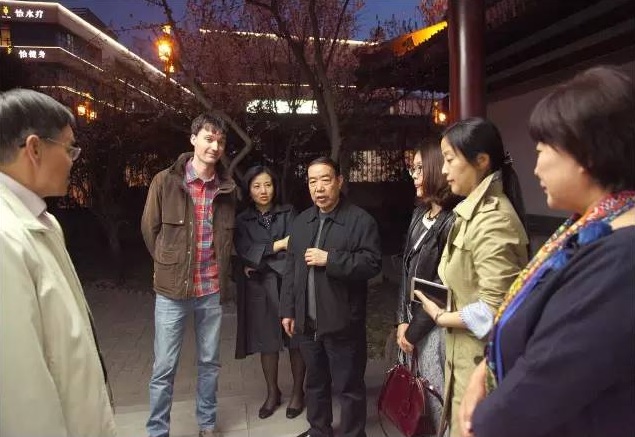UPDATE 3/8/2017: The website of the Jia Pingwa Project (which has since been renamed ‘Ugly Stone,’ in honor of Jia’s short story of the same name) is now live, with sample translations of The Poleflower, Shaanxi Opera, and Old Kiln Village. A final sample translation of Master of Songs is currently under consideration for the Asymptote Close Approximations fiction contest. Additionally, just last month, a short piece by YT on Jia and his work was featured on the blog of the Global Literature in Libraries Initiative, and Professor Jiwei Xiao announced that the Modern and Contemporary Chinese Forum would be sponsoring a roundtable on the same for the 2018 Modern Literature Association conference in New York City.
So, in March I met Jia Pingwa 贾平凹.1 Even if you’re familiar with Chinese literature in translation, you might not have heard of Jia, despite his towering presence in contemporary Chinese literature. That’s because very few of his books have been translated into English–the first was his 1988 novel Turbulence, translated by Howard Goldblatt and published by Louisiana State University Press after winning the Mobil Pegasus Prize for Literature in 1991.2 Goldblatt, of course, is also the translator of Mo Yan, whose 2012 Nobel prize win seemed (if ever so briefly) to indicate that the tide was finally starting to turn for the reception of Chinese literature in translation.
Jia is fourth from the left, beanstalk in plaid is your humble author
Much more recently, Goldblatt returned to Jia’s work with his translation Ruined City, the second ever English language translation of a novel length work by Jia, published by Oklahoma University Press in January, 2016, as part of their Chinese Literature Today series. Perhaps on account of having been published by an academic press, so far this book has been largely ignored by mainstream critics with a single, solitary review in the New York Times. Lumped together with two other books under the telling title “Banned in Beijing,” Jess Row’s review has a less than promising start:
The Chinese title of this sprawling novel, “Feidu,” means “abandoned capital.” It refers not to Beijing but to Jia Pingwa’s hometown, Xi’an, called Chang’an when it was the political and spiritual center of the Tang dynasty. In its time possibly the largest and most cosmopolitan city in the world, Xi’an (Xijing in the novel) has, in Jia’s description, become a dilapidated backwater by the 1980s.
In fact, the English translation of ‘Abandoned Capital,’ used to refer to work prior to Goldblatt’s translation, seems to have been inspired not by the Chinese original, but instead the award-winning 1997 French translation by Genevieve Imbot-Bichet as La Capitale déchue, meaning something like the ‘Fallen Capital’ or the ‘Deposed Capital.’ In Chinese, the title is much more ambiguous, with the first character, 废, meaning both ‘abandoned’ (in the sense of ‘ruins’ 废墟 or ‘scrap/waste’ 废品), but equally a thing which has been ruined or abolished, as when one nullifies a treaty 把条约废了,ruins ones body / happiness 把身体/幸福废了 or to ‘end someone,’ as in the title of the popular web novel 特工皇妃:皇上我要废了你 (‘Special Agent Imperial Concubine: Emperor, I Will End You’). The second character, 都, is also tricky, because it can mean both ‘capital’ 首都, and also ‘city,’ as in 大都市 (‘major metropolis’). In a short translators note at the end of the novel, Goldblatt explains that
…when I asked Jia how he wanted it to be rendered, he said he preferred “city” over “capital,” since the latter no longer applied, and asked for a term of destruction, not abandonment, as some critics and scholars have used, in the title.
- Yes, 凹 is usually pronounced āo, not wā. An explanation of his pen name is available here. [↩]
- In 2003 Goldblatt’s translation was republished by Grove Press. Most editions I’ve come across are from this later reprinting. [↩]
